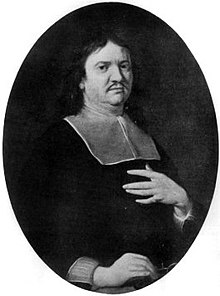Henry Oldenburg

Henry Oldenburg (also Henry Oldenbourg) (c. 1619 as Heinrich Oldenburg – 5 September 1677) was a German theologian known as a diplomat, a natural philosopher and as the creator of scientific peer review. He was one of the foremost intelligencers of Europe of the seventeenth century, with a network of correspondents to rival those of Fabri de Peiresc, Marin Mersenne and Ismaël Boulliau.[1] At the foundation of the Royal Society he took on the task of foreign correspondence, as the first Secretary.[2][3]
Early life
Born in Bremen, Germany, he trained in theology and received his degree on 2 November 1639. His movements during the 1640s are unclear, but he is thought to have worked as a tutor in England for much of the decade. In 1648 he left England and travelled, returning in the end to Bremen.[4]
He went to London in 1653, as a diplomat, and settled in England of the Interregnum. He forged a strong relationship with his lifelong patron Robert Boyle, and was tutor to Boyle's nephew Richard Jones. Oldenburg married his second wife, Dora Katherina Dury (1654–77), the daughter of John Dury. Either through John Milton, whom he met early in his mission, or through Lady Ranelagh, sister to Boyle and the mother of Richard Jones, Oldenburg gained entry to an important intellectual circle, including Samuel Hartlib, whose extensive web of correspondents Oldenburg was to take over, John Dury who became his father-in-law, and others such as William Petty.[5] Among Oldenburg's correspondents at this time was Baruch Spinoza, who he was introduced to on a trip to the Netherlands, and to whom he presented a volume of writings on scientific topics by Boyle.[6]
Secretary of the Royal Society
After the Restoration he became an early member (original fellow) of the Royal Society (founded in 1660), and served as its first secretary along with John Wilkins, maintaining an extensive network of scientific contacts through Europe. He also became the founding editor of the Philosophical Transactions of the Royal Society. Oldenburg began the practice of sending submitted manuscripts to experts who could judge their quality before publication. This was the beginning of both the modern scientific journal and the practice of peer review.[7] Philosophical Transactions of the Royal Society continues today and is the longest running scientific journal in the world.
He was briefly imprisoned in the Tower as a suspected spy in 1667, during the Second Anglo-Dutch War.[8]
Oldenburg's correspondence was linked to support from the politician Sir Joseph Williamson; in part Oldenburg supplied Williamson with intelligence information.[9]
Oldenburg enjoyed good health in his lifetime, but he fell seriously ill on 3 September 1677, and he died two days thereafter at his Pall Mall, London home. He was interred on 7 September at St Mary the Virgin, Bexley. His widow died ten days later.
Foreign correspondents
Denmark
Flanders
France
Germany
- Sir William Curtius,[14] Johann Hevelius, Gottfried Leibniz, Philipp Jacob Sachs von Lewenheimb, Johann Daniel Major,[12] Ehrenfried Walther von Tschirnhaus,[15] Martin Vogel.[16]
Italy
Netherlands
- Reinier de Graaf, Christiaan Huygens and his father, Constantijn Huygens,[18] Antoni van Leeuwenhoek, Willem Ten Rhijne, Benedictus/Baruch Spinoza,[12] Peter Serrarius,[19] Jan Swammerdam,[20] Isaac Vossius.[20]
See also
References
- ^ Hatch, Robert A. (February 1998). "The Scientific Revolution: Correspondence Networks". University of Florida. Retrieved 21 August 2016.
- ^ Oldenburg, Henry (1665). "Epistle Dedicatory". Philosophical Transactions of the Royal Society. 1. doi:10.1098/rstl.1665.0001.
{{cite journal}}:|access-date=requires|url=(help) - ^ Hall, Marie Boas (2002). Henry Oldenburg: shaping the Royal Society. Oxford: Oxford University Press. ISBN 0-19-851053-5.
{{cite book}}: Invalid|ref=harv(help) - ^ Bluhm, R. K. (1960). "Henry Oldenburg, F.R.S. (c. 1615-1677)". Notes and Records of the Royal Society. 15: 183–126. doi:10.1098/rsnr.1960.0018.
- ^ Hall 2002, pp. 16–18
- ^ Nadler, Steven (1999). Spinoza: A Life. Cambridge: Cambridge University Press. pp. 184–187. ISBN 0-521-55210-9.
- ^ Committee on Science, Engineering, and Public Policy; National Academy of Sciences; National Academy of Engineering; Institute of Medicine (1995). On Being a Scientist: A Guide to Responsible Conduct in Research (2nd ed.). Washington, D.C.: National Academy Press.
{{cite book}}:|last1=has generic name (help)CS1 maint: multiple names: authors list (link) - ^ Mertens, Frank (29 July 2008). "Extended chronological table, 1660s". Franciscus van den Enden. Retrieved 21 August 2016.
- ^ Hatch, Robert A. (December 1998). "The Scientific Revolution: Westfall Catalogues - Scientific Community". University of Florida. Retrieved 21 August 2016.
- ^ Oldenburg, Henry (1977). Hall, A. Rupert; Hall, Marie Boas (eds.). The Correspondence of Henry Oldenburg. Vol. XI. London: Mansell Information/Publishing Limited. pp. vi. ISBN 0-7201-0630-3.
{{cite book}}: Invalid|ref=harv(help) - ^ Hall 2002, pp. 152–3.
- ^ a b c d Lux, David S.; Cook, Harold J. (1998). "Closed circles or open networks?: communicating at a distance during the scientific revolution". History of Science. 36 (112). Science History Publications Ltd: 179–211. Retrieved 21 August 2016.
- ^ Oldenburg 1977, p. ix.
- ^ Maat, Jaap (2012). Philosophical Languages in the Seventeenth Century: Dalgarno, Wilkins, Leibniz. Springer Science & Business Media.
- ^ Oldenburg 1977, pp. xx–xxi.
- ^ Hall 2002, p. 151.
- ^ Oldenburg 1977, p. xi.
- ^ a b Oldenburg 1977, p. v.
- ^ Hall 2002, p. 80.
- ^ a b Oldenburg 1977, p. viii.
Further reading
- Jean-Pierre Vittu, "Henry Oldenburg 'Grand intermédiaire'", in "Les grands intermédiaires culturels de la République des Lettres", pub. by Christiane Berkvens-Stevelinck, Hans Bots and Jens Häseler, Paris, Honoré Champion, 2005, pp. 184–209
- Douglas Mc Kie: The arrest and imprisonment of Henry Oldenburg. In: Notes and Records of the Royal Society of London, 6, 1948/49, p. 28-47
- Thomas Elsmann: Im Schatten des Kaufmanns - Bremische Gelehrte 1600-1900, Bremen: Schünemann 2012, S. 80-99
